Anaesthetics On The Patagonian Plate
Posted by Jeremy Windsor on Jan 20, 2023
It's always good to hear from those who've competed the Diploma in Mountain Medicine (DiMM). Here's Dr Kitty Duncan to tell us about her recent work on the Falkland Islands...
December is a great time of year to head to the Falklands. Every year at nesting time the Islands are home to about 1 million penguins, from 5 different species. The island archipelago, which sits in the south Atlantic only 600 miles off Argentina, is one of the major penguin capitals of the world. They outnumber the human population by more than 300 to 1. The approximately 3600 human residents are from 60 different countries, although some can trace their Falkland Islander ancestors back through 9 generations. However, as a British overseas territory, politically and emotionally it is part of the UK.
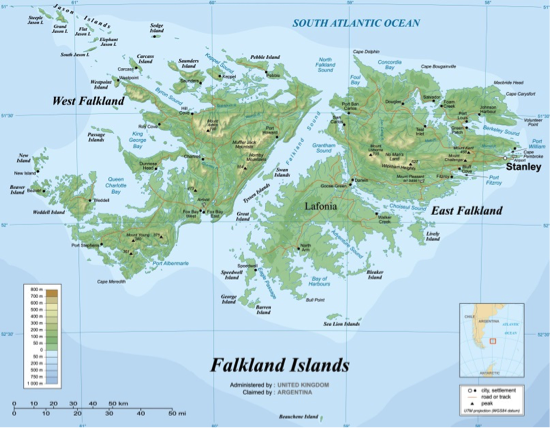
This year I made my second trip down here to work as the sole anaesthetist on the Islands for 3 months. There is no permanent anaesthetist – the combination of having to have the skills to deal with anything that comes through the door but with irregular exposure, plus 24hr on call, means that the islands are served by a rotation of locum anaesthetists. Previous experience in a ‘remote and rural‘ environment and the ability to drink no alcohol for 3 months are the main prerequisites.
The majority of the population live in Stanley, the capital (newly designated a city for the Platinum Jubilee). King Edward Memorial Hospital is the Islands’ only hospital. The medical staff comprises 4-5 GPs, a surgeon and the anaesthetist. The hospital has a theatre, the Islands’ only GP practice and dental surgery, plus physio and pharmacy. As of 2021, Radiology has a CT scanner as well as USS capabilities (there is one radiographer who does everything and is on call 24 hours a day). The theatre team includes ODPs and nurses, but their roles are extended to include outpatient surgical clinics and plastering, amongst other things. In fact, everyone’s roles are extended here – GPs become ED docs and Obstetricians, ward nurses become HDU nurses, firemen become ALS providers, and occasionally the anaesthetist has to become a GP. The extended role of the anaesthetist here is one of the reasons I enjoy the job (except when having to cover GP on call shifts!).
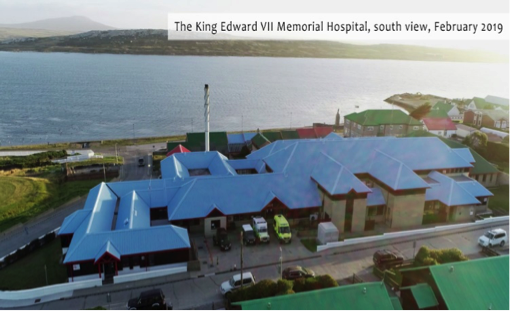
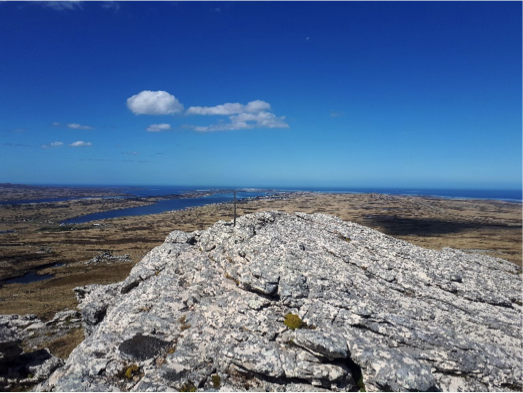
A view of the Stanley area from Mt Tumbledown
The arrest team consist of the anaesthetist, the on-call GP & ED nurse (who doubles as a paramedic), plus one of the two ward nurses and the on-call ambulance driver if they are free. For the trauma team add the surgeon to this list. For prolonged CPR, the on-call (volunteer) firemen can be called to help (there is no autopulse). Because the hospital team is small there is always an everyone-mucks-in attitude, and many times people will appear to help who technically aren’t on call.
So, although the hospital is not an austere environment in terms of kit, it certainly is in terms of the skillset of the staff and also the geographic isolation. It’s a long way to the nearest tertiary referral centre or specialist consultant, and that distance is worsened by two factors – the unpredictable severe weather and the lack of political links with Argentina (the geographically nearest country). Our emergency extraction pathways go either over the Andes to Santiago or up to Uruguay, and that takes time.
As the anaesthetist here you have to be comfortable and prepared to deal with everything from multi-trauma to obstetric emergencies to occasionally covering the GPs. Major emergencies are few and far between so the skillset of staff can be rusty, especially with any critically ill patient. A big part of the role is supporting the nurses and GPs with all sorts of cases you would never normally be involved in, for example thrombolysing stable MIs, discussing treatment of chronic pain patients, and helping with community palliative care. Whilst also being the cannulation/phlebotomy service of course!
As the only anaesthetist you are obliged to always be less than an hour from the hospital. That means international transfer of patients is usually undertaken by others. On this trip I did accompany one patient overland to Mount Pleasant – the airbase that doubles as the airport – as they had a GTN infusion running, and the nurse wasn’t happy to transfer alone. Another day I flew out to the west of West Falkland to pick up a patient who had suffered a fall. However, if there is a time-critical transfer of an intubated patient then the military fly them out to Uruguay, and that means the anaesthetist cannot go as it’s usually a 24-48hour turnaround (one of the GP's goes - extended roles again).
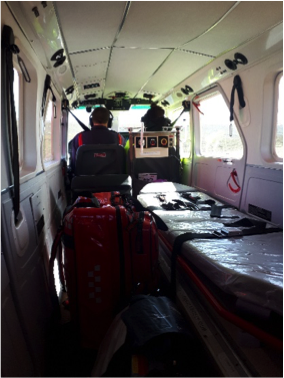
One of the Falkland Islands Government Air Service Islander aircraft set up as an ambulance.
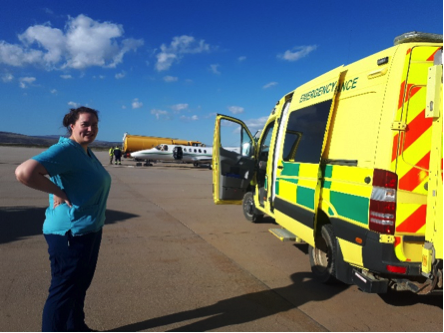
Waiting for the air ambulance to refuel at Mount Pleasant Air Base
I think the job has many more aspects in common with the practice of mountain medicine than your everyday anaesthetic job. Flexibility is required and using your ingenuity to solve problems both clinical and practical, plus understanding the implications of not having highly technical back up on site or even down the road. More specifically, understanding the various potential evacuation pathways and adapting the patient care to these is important. Many aspects of patient care are affected by where we are and the fact that we have to move people for definitive care, be it emergency or elective.
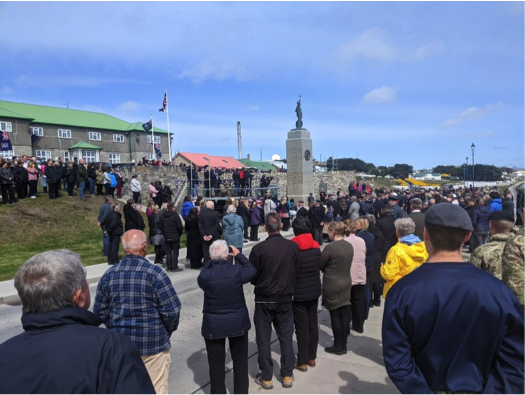
Remembrance Day parade at the 1982 Liberty Monument. 2022 was the 40th Anniversary of the Falkland’s conflict and therefore a very important year for the Islanders
Out of work, although you are necessarily confined to the area around Stanley, there is still plenty of outdoors to enjoy – the beaches are beautiful and in the summer you can see penguins, dolphins, and occasionally whales and orcas. You can also get up the local hills, whose names are synonymous with the 1982 war and are scattered with memorials, like Mt Tumbledown and Wireless Ridge. They may be called ‘Mounts‘ but they are maximum 300m tall. The rock, however, is great for playing on (carefully – breaking something would not make you popular!). There’s a good leisure centre and plenty of sports clubs, plus the Cape Pembroke Park Run every Saturday – the most southerly official park run in the world. If you want to expand your skills, see penguins and live in a unique, friendly and far-flung community, the Falkland Islands is the place to come!
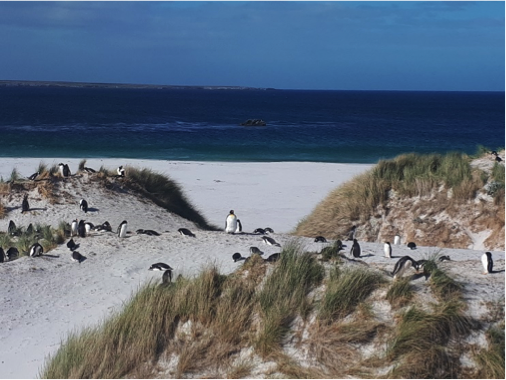
Yorke Bay penguin colony near Stanley. Yorke Bay was the last beach to be cleared of mines back in November 2022, 38 years after the war.
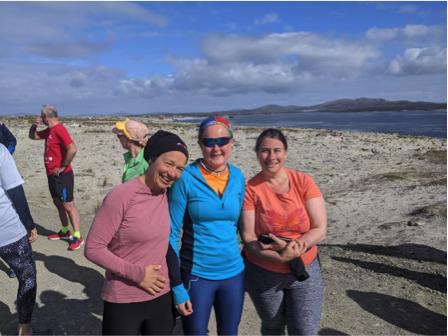
Park Run on a rare still and sunny day. With the theatre nurse and radiographer
Thanks Kitty! Kitty is a Consultant Anaesthetist who holds the DiMM and is part of the DiMM teaching faculty.
Thanks for reading this post. If this is your thing why don't you take a look at other posts on the blog? Better still, why not join the British Mountain Medicine Society? More information can be found here
For more information about the University of Central Lancashire's Diploma in Mountain Medicine (DiMM) take a look at this.
Comments
Leave a comment.
Leave a comment.



 )
)